Eivind Tjønneland, ed.: Henrik Ibsens Kongsemnerne.
IF 0.1
0 THEATER
引用次数: 0
Abstract
This book is based on presentations given at a seminar held in 2013 at the Ibsen Museum in Oslo to commemorate the publication of Kongsemnerne (The Pretenders) 150 years ago. The book contains ten articles, discussing on the one hand the relation between The Pretenders as an artifact and its historical subject and on the other its reception over the past 150 years. The result is a very diverse collection with a multitude of perspectives and many stimulating insights. Eivind Tjønneland, who organized the seminar, and who is the editor of the book, has the opening chapter. After a presentation of the various chapters, he turns to an intertextual analysis of certain key concepts of the drama. His point of departure is the hypothesis that behind the production of this drama one can trace Ibsen’s reception of certain phrases or fragments of phrases that have inspired him. A key concept in this connection is “kongstanke” (“kingly thought” or “high calling”), which in this case refers to the political vision of Haakon that Skule envies. Tjønneland assumes that Ibsen has coined this term based on newspaper articles that he must have read, some of which concerned the large choral fair in Bergen during the summer of 1863, where he was present; some of them also concerned the recent death of the historian Peter Andreas Munch, who was a leading historian at the time, and the historian upon whom Ibsen draws in many of his early historical dramas. The singers arriving from all over Norway were described as merging into one man; it was also suggested that这本书是根据2013年在奥斯陆易卜生博物馆举行的纪念《伪装者》出版150周年研讨会上的演讲内容改编的。这本书包含十篇文章,一方面讨论了伪装者作为一件人工制品与它的历史主题之间的关系,另一方面讨论了过去150年来它的接受情况。其结果是一个非常多样化的集合与众多的观点和许多刺激的见解。Eivind Tjønneland是这次研讨会的组织者,也是这本书的编辑,他写了第一章。在展示了各个章节之后,他转向对戏剧某些关键概念的互文分析。他的出发点是这样一个假设,即在这部戏剧的创作背后,人们可以追溯到易卜生对某些短语或短语片段的接受,这些短语或短语片段给了他灵感。在这方面的一个关键概念是“kongstanke”(“国王的思想”或“崇高的使命”),在这种情况下,它指的是斯库勒所羡慕的哈康的政治愿景。Tjønneland认为易卜生是根据他一定读过的报纸文章创造了这个词,其中一些是关于1863年夏天在卑尔根举行的大型合唱博览会的,他当时在场;其中一些还与历史学家彼得·安德里亚斯·蒙克最近的去世有关,他是当时的主要历史学家,易卜生在他早期的许多历史剧中都引用了这位历史学家。来自挪威各地的歌手被描述为合二为一;也有人建议
本文章由计算机程序翻译,如有差异,请以英文原文为准。
求助全文
约1分钟内获得全文
求助全文

 求助内容:
求助内容: 应助结果提醒方式:
应助结果提醒方式:


